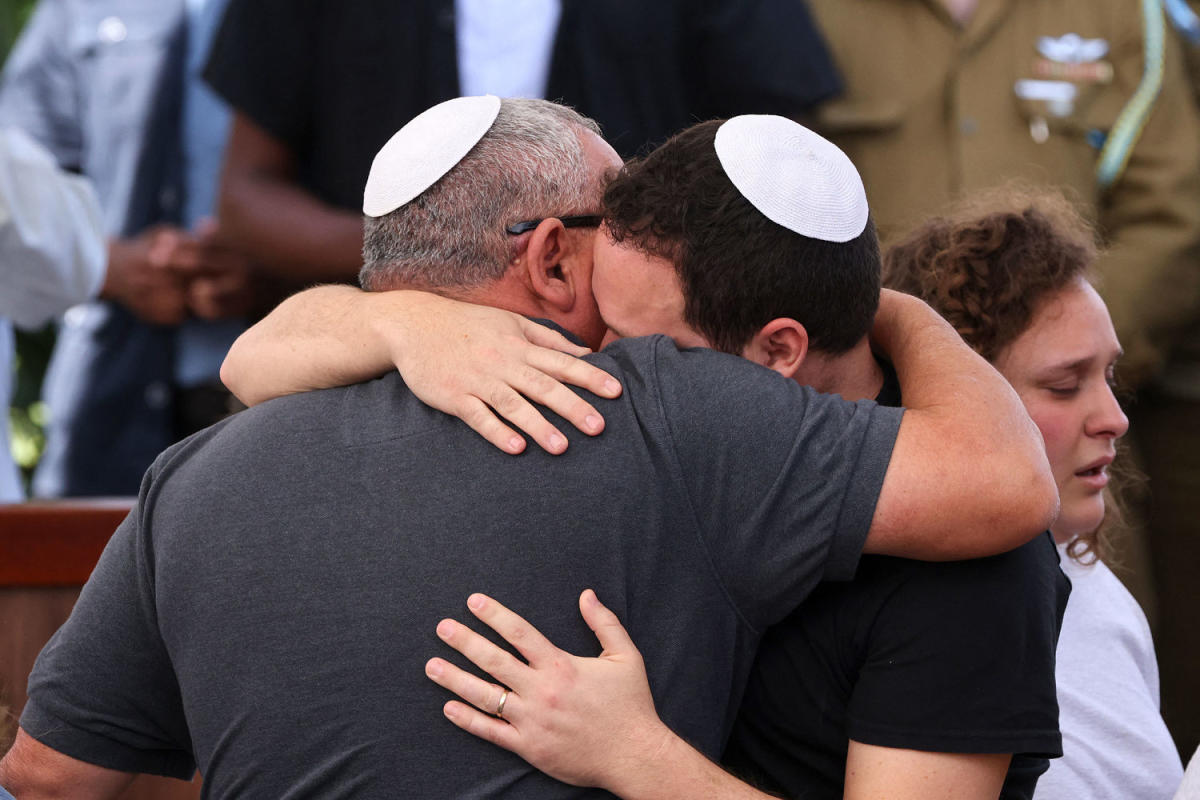HERZLIYA, Israel — Hagar Brodutch is haunted by many memories of her 51 days in Hamas captivity, but teaching her children to cry without making a sound is the most searing.
“It’s impossible for 4-year-olds to cry silently,” she told NBC News, speaking of her son Uriah, and her then 3-year-old neighbor Avigail Idan, whose parents were murdered in front of her, and whom Brodutch cared for along with her other children, Ofri, 10, and Yuval, 8.
Hagar Brodutch. (Hostages and Missing Families Forum headquarters via AP
Brodutch, 40, says her captors, a Palestinian family with 10 children in Gaza, were afraid neighbors or Israeli forces would be alerted that hostages were inside their house. Still, despite her family’s life-altering experience, she and her husband, Avihai, 42, say that the return of the remaining 134 hostages should take priority in the war.
That sentiment from Brodutch, of the hard-hit Kfar Aza kibbutz, and dozens of other returned hostages and their families interviewed by NBC News appears to be gaining traction among some of the Israeli leaders directing the war.
In comments broadcast late Thursday, a member of Israel’s war Cabinet for the first time said publicly that the release of hostages should take precedence.
Lt. Gen. Gadi Eisenkot, a former military chief of staff, not only called for the government to pursue a deal to release the hostages in Gaza, he criticized Prime Minister Benjamin Netanyahu’s handling of the war and called for elections to choose a new leader within a few months. These were stunning statements from a member of a war Cabinet convened precisely to maintain unity and run the country during war time.
“For me, the mission to save civilians is before killing the enemy,” said Eisenkot in a recorded interview with “Uvda,” an Israeli television news program.
Eisenkot, a nonvoting member of Israel’s war Cabinet, won widespread sympathy in Israel after his son, Gal Eisenkot, was killed while fighting in Gaza.
“I’m interested in promoting security for the state of Israel and ensuring that my son’s sacrifice wasn’t for nothing,” Eisenkot said, before describing divisions in the Cabinet. “There was a stage in one of the discussions where I said that if the subject of the abductees wasn’t going to be promoted then I am betraying my role and have nothing to do here.”
The Israeli public feels a sense of urgency to get the remaining hostages out, but they are not willing to give up on Israel’s goal of destroying Hamas. Two-thirds of Israelis said they don’t think the Israel Defense Forces should reduce heavy bombing of densely populated areas in Gaza, according to a recent poll by the Israel Democracy Institute.
“Israelis understand that time matters in order to get as many hostages out alive as possible,” said Nadav Eyal, a columnist for the newspaper Yedioth Ahronoth. “They also understand that you should prioritize the lives of these hostages who are being murdered by Hamas and you can always destroy Hamas later.
Released hostages, Hen Goldstein-Almog and her daughter Agam (L) take part at a Kfar Aza community event on the fourth night of Hanukkah on December 10, 2023 in Shefayim, Israel. Ch en Goldstein-Almog and three of her four children were released during in November weeklong ceasefire. (Amir Levy / Getty Images file)
NBC News has spoken to dozens in the hostage community, including former hostages and the families of current and former captives, since Hamas’ Oct. 7 terrorist attack killed more than 1,000 people, mostly civilians, and resulted in the kidnapping of 240, according to Israeli officials..
I have reached out to dozens in the hostage community, including former hostages and the families of current and former captives, since Hamas’ terrorist attack on October 7, which resulted in the deaths of more than 1,000 people and the kidnapping of 240, according to Israeli officials. .
Chen Goldstein-Almog, 49, watched in desperation as her husband and daughter were murdered right in front of her on Oct. 7. She and her three surviving children were kidnapped and held captive in Gaza for 51 days.
Goldstein-Almog, also from Kfar Aza, said she and the children would talk to their captors as a survival tactic during the seemingly endless hours of captivity.
“There were difficult conversations, sometimes to the root and depth of the conflict, which according to them we were the ones who expelled them and murdered them in 1948 when the state of Israel was established,” she told NBC News in a phone interview Friday. “We tried to maintain good relations with them because we were in their hands.”
Smoke rises following an Israeli bombardment in the Gaza Strip, as seen from southern Israel, Thursday, Jan.18, 2024. The army is battling Palestinian militants across Gaza in the war ignited by Hamas’ Oct. 7 attack on Israel. (Ohad Zwigenberg / AP)
Now that some of the hostages are home and beginning a new journey to process the trauma and loss they’ve experienced, some are returning to their kibbutzim to check on homes that are still uninhabitable following the attack.
Avihai Brodutch traveled to Kfar Aza on Friday from the family’s temporary home in Herzliya. The names of his friends tragically killed on Oct. 7 are written on a sign by the kibbutz’s armory for visitors to see.
“I see their names and I feel no desire for revenge even now,” he said. “I just want peace.”
This article was originally published on NBCNews.com
